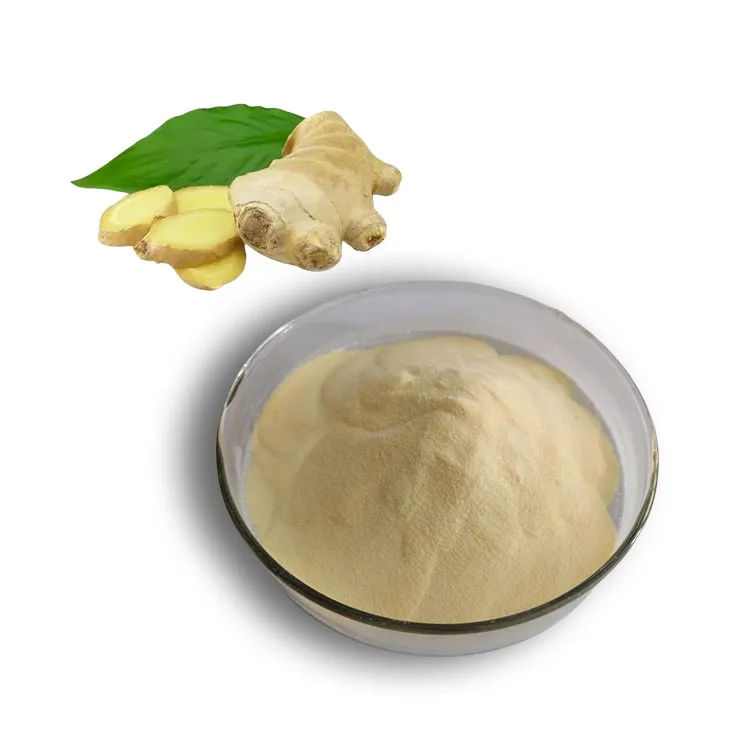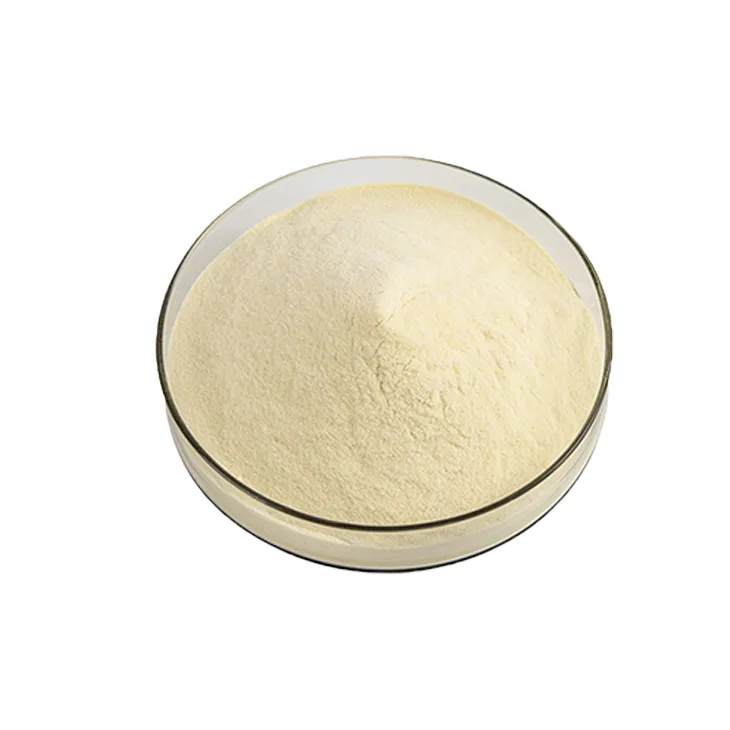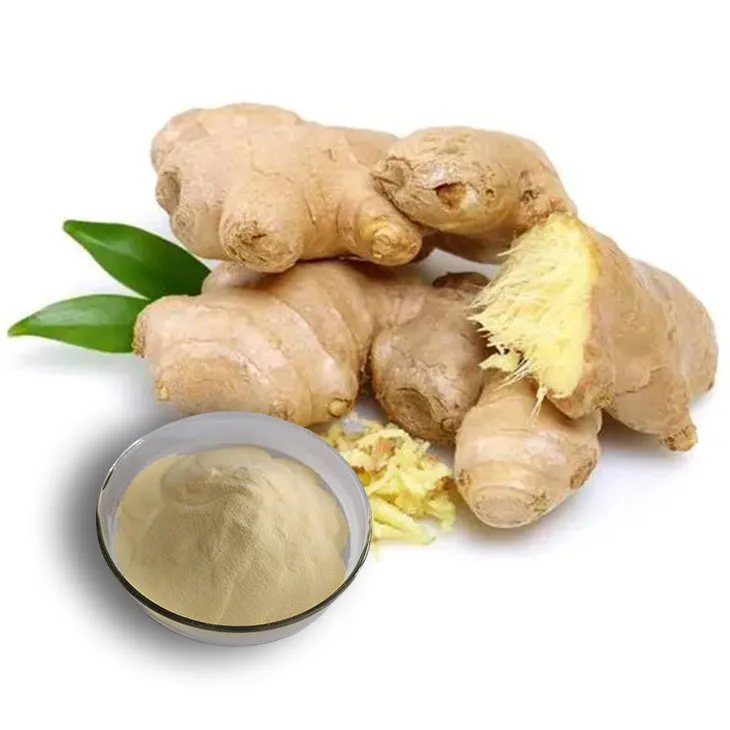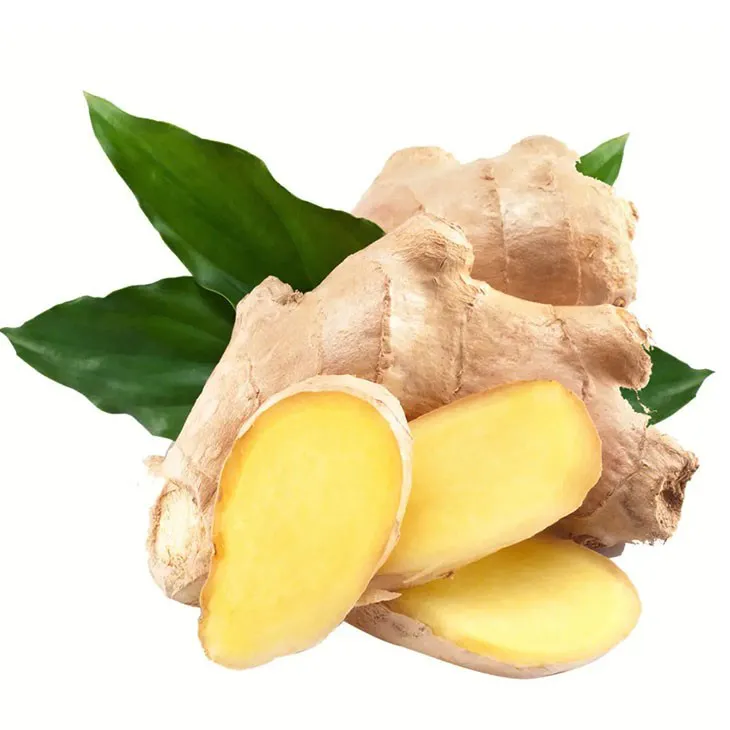- 0086-571-85302990
- sales@greenskybio.com
From Kitchen to Clinic: The Versatility of Ginger Extract in Health and Industry
2024-07-04

1. Introduction
Ginger (Zingiber officinale) has been an integral part of human culture for centuries. Ginger Extract, derived from this remarkable plant, is now emerging as a substance with far - reaching applications. It has transitioned from being a mere flavor enhancer in the kitchen to a potential therapeutic agent in clinics and a valuable component in various industries.

2. Ginger Extract in the Kitchen
2.1 Flavor Profile
Ginger Extract is renowned for its unique flavor. It has a warm, spicy, and slightly sweet taste that can transform a dish. The flavor of ginger extract is a complex combination of various chemical compounds. Zingerone and gingerol are two of the key components responsible for its characteristic taste. These compounds give ginger extract the ability to add depth and warmth to both sweet and savory dishes.
2.2 Culinary Applications
Ginger extract is used in a wide variety of culinary creations.- In Asian cuisine, it is a staple ingredient in stir - fries, curries, and soups. For example, in Thai green curry, ginger extract adds a spicy and aromatic note that complements the other herbs and spices.
- In baking, it can be used to flavor gingerbread, cookies, and cakes. The addition of ginger extract gives these baked goods a distinct and inviting flavor.
- It is also used in beverages. Ginger ale, for instance, owes its characteristic flavor to ginger extract. Additionally, ginger extract can be added to hot tea for a soothing and flavorful drink.

3. Ginger Extract in Health
3.1 Anti - Inflammatory Properties
One of the most significant health benefits of ginger extract is its anti - inflammatory effect. Chronic inflammation is associated with many diseases, such as arthritis, heart disease, and certain cancers. Ginger extract contains bioactive compounds like gingerol, which has been shown to inhibit the production of inflammatory cytokines. This helps in reducing inflammation at the cellular level.- In arthritis, ginger extract may help relieve joint pain and swelling. Studies have suggested that regular consumption of ginger extract can improve the symptoms of osteoarthritis and rheumatoid arthritis.
- It may also play a role in reducing inflammation in the cardiovascular system, potentially lowering the risk of heart disease.
3.2 Antioxidant Activity
Ginger extract is a rich source of antioxidants. Antioxidants are substances that protect the body against oxidative stress, which is caused by free radicals. Free radicals are unstable molecules that can damage cells and DNA, leading to various diseases and aging.- The antioxidants in ginger extract, such as gingerol and shogaol, can scavenge free radicals and neutralize their harmful effects. This antioxidant activity may contribute to the prevention of cancer, neurodegenerative diseases like Alzheimer's and Parkinson's, and other age - related disorders.
- By protecting cells from oxidative damage, ginger extract can also support healthy skin. It may help in reducing wrinkles, improving skin elasticity, and protecting against skin diseases caused by oxidative stress.
3.3 Digestive Health
Ginger extract has long been used to promote digestive health.- It can stimulate the production of saliva and gastric juices, which aids in digestion. This makes it useful for people with indigestion, bloating, and other digestive problems.
- Ginger extract also has anti - nausea properties. It is commonly used to relieve morning sickness in pregnant women and nausea associated with chemotherapy or motion sickness.
3.4 Immune System Support
The bioactive compounds in ginger extract can enhance the immune system.- It can stimulate the activity of immune cells, such as macrophages and lymphocytes. These cells play a crucial role in fighting off infections and diseases.
- Regular consumption of ginger extract may help the body to better defend itself against common colds, flu, and other viral and bacterial infections.

4. Ginger Extract in Industry
4.1 Pharmaceutical Industry
In the pharmaceutical industry, ginger extract holds great potential.- Its anti - inflammatory and antioxidant properties make it a candidate for the development of new drugs. Scientists are exploring ways to isolate and purify the bioactive compounds in ginger extract to create more effective medications for diseases such as arthritis and cancer.
- Ginger extract may also be used as an adjuvant in drug formulations. It can enhance the absorption and bioavailability of other drugs, improving their therapeutic effects.
4.2 Cosmetic Industry
The cosmetic industry has also recognized the value of ginger extract.- Due to its antioxidant and anti - inflammatory properties, ginger extract is used in skincare products. It can be found in creams, lotions, and serums, where it helps to protect the skin from damage, reduce inflammation, and improve skin texture.
- In haircare products, ginger extract can stimulate hair growth. It may improve blood circulation in the scalp, providing the hair follicles with more nutrients and oxygen, which is essential for healthy hair growth.
4.3 Food and Beverage Industry
In the food and beverage industry, ginger extract has multiple applications.- As a natural flavor enhancer, it is used in a wide range of products, from processed foods to beverages. It provides a natural alternative to artificial flavors, appealing to consumers who prefer natural ingredients.
- Ginger extract can also be used as a preservative. Its antimicrobial properties can help to extend the shelf life of food products, reducing the need for chemical preservatives.

5. Conclusion
Ginger extract is truly a versatile substance. It has a long - standing history in the kitchen, enhancing the flavor of countless dishes. In the health realm, its numerous bioactive compounds offer a wide range of benefits, from reducing inflammation to supporting the immune system. In industry, it is finding increasing use in pharmaceuticals, cosmetics, and the food and beverage sectors. As research continues, we can expect to discover even more applications for this remarkable extract, further solidifying its place as a valuable resource from the kitchen to the clinic and beyond.
FAQ:
What are the main bioactive compounds in ginger extract?
Ginger extract contains several important bioactive compounds. One of the main ones is gingerol, which is responsible for many of ginger's characteristic properties such as its pungent flavor and some of its health - promoting effects. Other compounds include shogaol, which is formed when gingerol is dehydrated, and zingerone. These compounds work together to contribute to ginger extract's versatility in health and other applications.
How does ginger extract enrich culinary experiences?
Ginger extract adds a unique and distinct flavor to various dishes. It has a warm, spicy, and slightly sweet taste. It can be used in both sweet and savory recipes. In baking, it can add a special zing to cookies, cakes, and bread. In savory cooking, it pairs well with meats, vegetables, and soups, enhancing the overall flavor profile and adding depth and complexity to the dish.
What role does ginger extract play in combating diseases?
Ginger extract has been associated with several disease - fighting properties. It has anti - inflammatory effects, which can be beneficial in conditions such as arthritis. It may also have antioxidant properties, helping to combat oxidative stress in the body, which is linked to various diseases including heart disease and cancer. Additionally, ginger extract has been studied for its potential to aid in digestion, relieve nausea, and may even have antimicrobial effects against certain pathogens.
How is ginger extract used in the industry, especially in drug development?
In the industry, ginger extract shows potential in drug development. Its bioactive compounds can be studied for their pharmacological activities. For example, its anti - inflammatory and antioxidant properties may be harnessed to develop new drugs for treating inflammatory diseases or for protecting against oxidative damage. It can also serve as a starting point for the synthesis of new compounds with enhanced therapeutic effects. Additionally, ginger extract can be used as a natural additive in consumer products like cosmetics and dietary supplements due to its perceived health benefits.
Is ginger extract safe for everyone in terms of health?
Generally, ginger extract is safe for most people when consumed in normal amounts. However, some individuals may experience side effects such as heartburn, stomach upset, or allergic reactions. People with bleeding disorders should be cautious as ginger may have blood - thinning properties. Pregnant women can often use ginger to relieve nausea, but it's still advisable to consult a healthcare provider before using ginger extract in large amounts or in supplement form.
Related literature
- The Health - Promoting Properties of Ginger Extract: A Review"
- "Ginger Extract in the Food and Pharmaceutical Industries"
- "Bioactive Compounds in Ginger and Their Potential Therapeutic Applications"
- ▶ Hesperidin
- ▶ Citrus Bioflavonoids
- ▶ Plant Extract
- ▶ lycopene
- ▶ Diosmin
- ▶ Grape seed extract
- ▶ Sea buckthorn Juice Powder
- ▶ Fruit Juice Powder
- ▶ Hops Extract
- ▶ Artichoke Extract
- ▶ Mushroom extract
- ▶ Astaxanthin
- ▶ Green Tea Extract
- ▶ Curcumin
- ▶ Horse Chestnut Extract
- ▶ Other Product
- ▶ Boswellia Serrata Extract
- ▶ Resveratrol
- ▶ Marigold Extract
- ▶ Grape Leaf Extract
- ▶ New Product
- ▶ Aminolevulinic acid
- ▶ Cranberry Extract
- ▶ Red Yeast Rice
- ▶ Red Wine Extract
-
American Ginseng Root Extract
2024-07-04
-
Citrus Aurantii Extract
2024-07-04
-
Purple Sweet Potato Extract
2024-07-04
-
Dan Shen Root Extract/Salvia Root Extract
2024-07-04
-
Okra Extract
2024-07-04
-
Red Date Extract
2024-07-04
-
Thunder God Vine Extract
2024-07-04
-
Kidney Bean Extract
2024-07-04
-
Uridine-5'-monophosphate Disodium salt
2024-07-04
-
Gynostemma pentaphyllum extract
2024-07-04





















